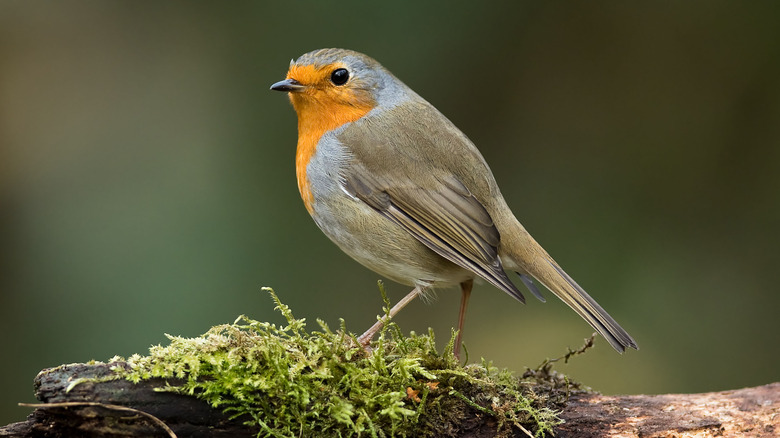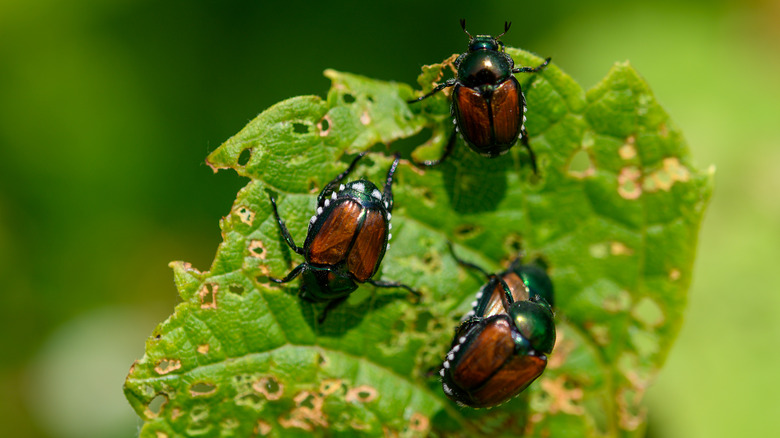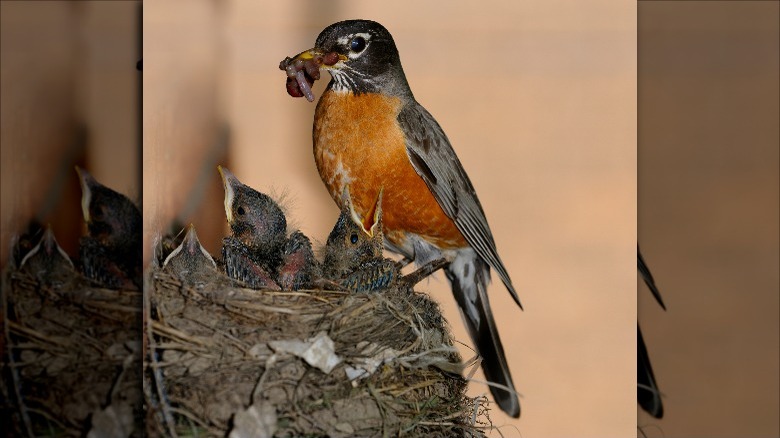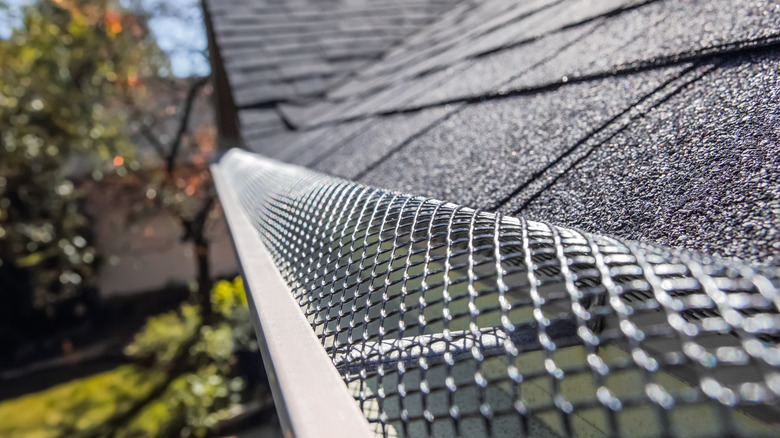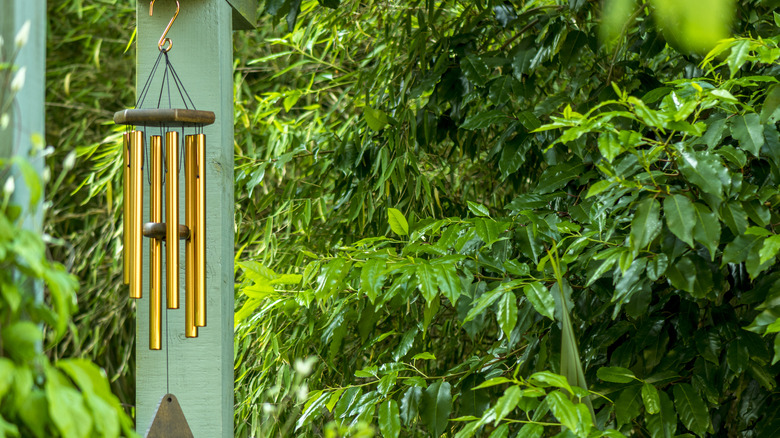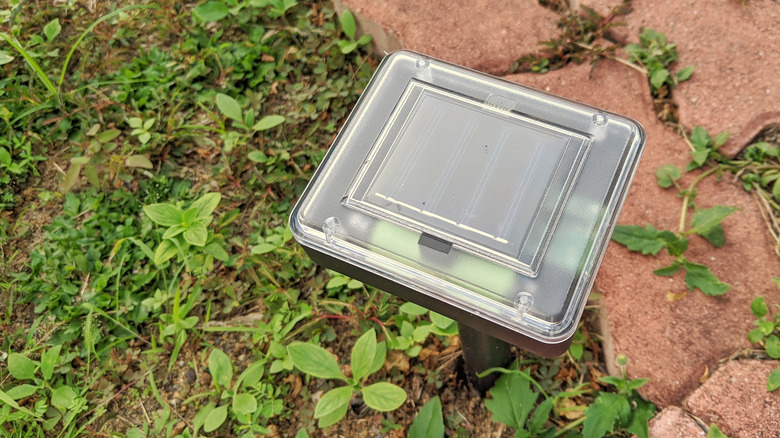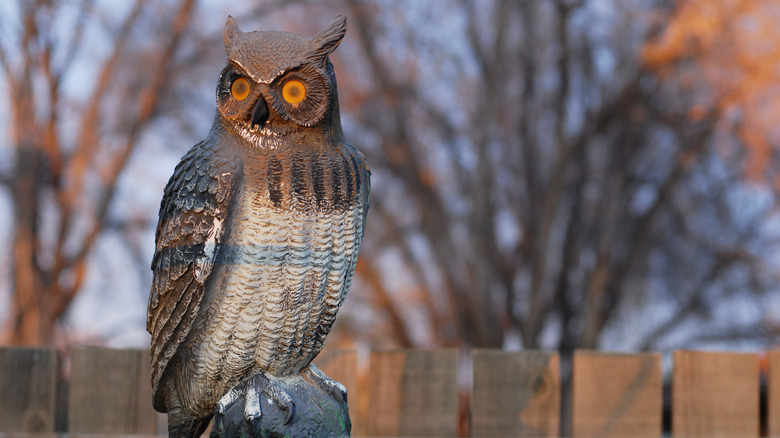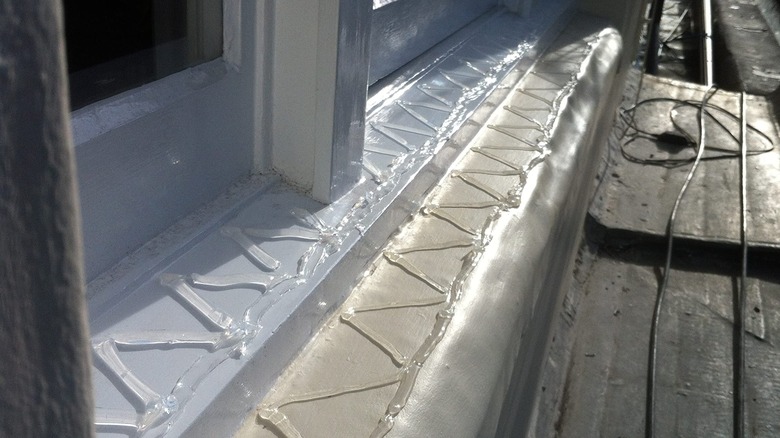10 Best Ways To Get Rid Of Robins
Some pests might be more annoying, destructive, or just plain nastier than others. While each might be bothersome in its own way, homeowners have every reason to be determined to get rid of them all. For instance, we wouldn't blame you at all for not wanting bats in your attic, frogs in your yard, or flying ants anywhere around your home. The same goes for robins.
Wait! Robins? Yep! While it's true that the birds are beautiful and have a sweet song, they don't make ideal roommates — and you definitely don't want them in your house. They can also be problematic to have in your yard as they can leave behind disgusting debris and attract neighborhood predators. In fact, the Family Handyman includes robins on their list of the "Worst Garden Pests" due to the fact that they make a mess of your mulch and eat up all of your berries.
That's why, if you have robins around, then you'll definitely want to read on to find out the best ways to get rid of them.
1. Get rid of the robins' food source
Robins are pretty typical birds when it comes to what they like to eat. That means that along with various kinds of bugs, they also like to dine on both seeds and berries, and will also nibble on other tasty fruit when it suits them or when it's easily available. Specifically, when it comes to insects, Love the Garden notes that a robin's preferred food includes things like beetles, mealworms, and earthworms. Um, yum?
While it might be impossible to completely rid your yard of things like earthworms, you can make it harder for the birds to find things like beetles. Japanese beetles can be particularly prevalent in some places where robins are also found and can do some serious damage to your trees and other plants, so along with eliminating them from your yard for that reason, you'll also be providing less food for potentially problematic robins. Without an abundance of food, the birds may move on.
2. Get rid of existing nests
When a robin builds a nest around your home in order to create a safe space to lay its eggs and raise its babies, Wild Birds Unlimited points out that there's a good chance that they'll opt to do so in something like a tree or bush that's in your yard. While having baby robins around it might seem like an adorable thing at first — and their bright blue eggs are incredibly beautiful — the adult birds can create a big mess in the area where they build their nests as can their babies once they've hatched.
If a robin has already built a nest in your yard, then you might have to wait until its babies are grown and have flown off on their own adventures. Birds & Blooms notes that they fly away (or fledge) when they're around 13 days old. At that point, you can simply slip on some gloves to keep yourself safe, take the nest down from wherever it might be (following these instructions), and throw it away (it's probably too dirty and insect-ridden to keep as a natural souvenir, but that's your call).
If, on the other hand, you want to prevent robins from making nests in the first place or don't want them to return, then keep reading!
3. Put screens around structures and openings
Although robins naturally build their nests high up in trees and in other tall plants, according to Wild Birds Unlimited, they will also happily settle for spots around your home that are just as convenient, protected, and comfortable for them. For instance, you might find them tucked away behind light fixtures or in gutters.
If you want to prevent a robin from picking one of these areas for its nest, then you can take advantage of mesh screens that will block them from getting to the desired spot. Screens can be cut to fit the space you need, bend to shape themselves around certain spots, and be removed if you no longer need them.
Along with using screens on or around areas that we've mentioned, like light fixtures and gutters, Nixalite of America Inc. also mentions considering popping some up on spaces on or around roofs, chimneys, and solar panels, while you'll always want to keep an eye open (and deal with) open vents and any other holes in your home.
4. Cover your gardens with netting
In the same way that you can use mesh screens to keep robins away from your home and structures around your yard, you can use netting to keep the birds away from your gardens. Protecting your veggie plants and berry patches from birds, deer, and other hungry critters, according to 21 Oak, you can choose netting that is as wide or as narrow as you need depending on which animals are around and causing issues.
On top of that, you can also opt for netting that comes along with pre-made structures that you can simply pop on top of your garden beds. Or, if you are interested in saving some money and like to use a more D.I.Y. method, then Sunset has a hack that will give you that same result for just $3 worth of material from your local hardware store.
Whatever kind of netting you use, it will allow you to still get to whatever it is that you're growing — and let the sun and rain through, which is important for keeping your plants thriving — but keep robins out at the same time.
5. Put up wind chimes
Do you love wind chimes? Whether they are made of wood, metal, or glass, wind chimes can add a musical touch to any breezy day. However, while you might find yourself attracted to the sound, robins don't share that feeling. In fact, according to Open Backyard, wind chimes might actually freak birds out and keep them away. The outlet notes that wind chimes that make loud sounds that are also deeper in tone work best for scaring birds.
Pest Pointers agrees that big, noisy wind chimes can do the trick. However, they also explain that birds can become used to the noise made by any kind of wind chime, so the musical item may not be a permanent solution. You should also know that, per Open Backyard, some wind chimes — that is, those that are smaller and make softer sounds — might actually attract birds to your yard. That means that you'll want to be sure to pick the right kind and play around with what works and what doesn't. As you do, you'll have the added benefit of getting to enjoy lovely wind chimes!
6. Use a sonic repeller
If the robins in your yard aren't put off by your wind chimes, then it might be time to consider something more powerful. By that, we mean something that makes a stronger — or rather, higher — noise that might be more likely to make your yard an unappealing place for birds. In this case, you may want to use what's called a sonic repeller or ultrasonic repeller.
Bob Vila explains that these devices create electromagnetic and ultrasonic sound waves that are out of a human's range of hearing but that animals are annoyed by and, in turn, avoid. Apparently good to keep away a range of pests like birds, rodents, snakes, and moles, most models either run off solar power or need to be plugged into an electrical source.
While that sounds pretty darn good, McGill University's OSS Intern Cassandra Lee questioned how effective sonic repellers are when it comes to keeping unwanted critters away. In her opinion, "the science behind ultrasonic pest repellers is ultra-shaky," which is surely why "these devices have never been proven to actually work." At the same time, Bob Vila suggested the ones that they consider to be the best, so you might have to see for yourself if they're effective in your particular robin-related situation.
7. Put up streamers or cords
Jarring sounds aren't the only things that can scare robins away from the area around your home. If you don't want wind chimes making noise in your yard and aren't interested in sonic repellers, but don't mind adding a little extra decoration to your outside space, then try hanging up colorful streamers or cords.
According to Bird Watching Daily, birds will do their best to keep their distance from things like nylon cords and monofilament lines. Apparently, tests have even shown that this is effective when it comes to deterring birds from flying around (or into) windows and so it can also be used to simply make them keep their distance from the rest of your home.
As for what kind of streamers, strings, or cords you should opt for, that really depends on your personal taste. Maybe you'd like a reflecting ribbon to ward off birds, or want to try out hanging reflectors specifically made to scare away birds. Whatever suits you and your home best, it's likely the robins won't be so keen to see it.
8. Install a fake predator
Although there are obviously a few different ways to get rid of robins and make your home less attractive to them, one of the most effective methods is something that has to do with nature itself. Robins are understandably afraid of their natural predators, which Pest Repellent Ultimate points out includes things like owls, hawks, falcons, crows, blue jays, magpies, and grackles.
That's why finding and installing a fake predator can help to keep robins away. Think of it as an animal-shaped scarecrow that's meant to ward off robins. In fact, both Cornell University and Linfield College in Oregon (via Sciencing) have backed up the claim that fake owls can do the trick when it comes to scaring off birds. However, they also noted that it might only work for a short period of time.
Why is that? Well, birds happen to be incredibly smart and may figure out that your plastic predator isn't the real deal. In that case, you might want to switch up which fake creature you're using or try one of the other handy options on this list to get rids of robins.
9. Apply sticky gel to surfaces
A sticky gel can also help you keep robins away from your home. These gels are designed to be applied directly to any surfaces where birds may land. Before applying the gel, observe the robins in your yard and identify the surfaces where they tend to rest, such as the edges of your gutters, the railings along your porch, the edge of your deck, or the branches on the trees in your yard. Once you've identified their preferred resting areas, you can apply the gel directly to these surfaces. When the robins land on the gel, they will be irritated by its stickier texture. This will encourage them to leave the area and look for somewhere else.
In addition to being sticky, these gels are also clear. This means that you won't need to worry about them taking away from the aesthetics of your porch or yard. Bird-repellent gels are also non-toxic. So, follow the manufacturer's instructions, and you don't need to worry about causing any harm to the robins on your property. Sticky gels can also be a long-lasting solution as they may continue working to keep birds away for up to a year.
10. Use DIY bird repellents
Robins despise the scent of chili peppers. You can use this to your advantage by making a DIY Robin deterrent spray with chili peppers, water, and apple cider vinegar. To strengthen the scent of the chili peppers, you'll want to allow them to go through the fermentation process. For this to occur, start by slicing 40 to 50 chili peppers into very thin pieces. Add the chili pepper slices into a bowl or bucket with about one gallon of water. After giving everything a good stir, leave the bowl or bucket out in the sun for a minimum of two days.
After the chili peppers have fermented, pour about ½ cup apple cider vinegar into the bowl or bucket with them and the water. Mix the solution well, and then transfer it to a spray bottle. You can spray any surfaces where the robins have been gathering. However, just take care not to spray it directly on any flowers or plants in your garden.
